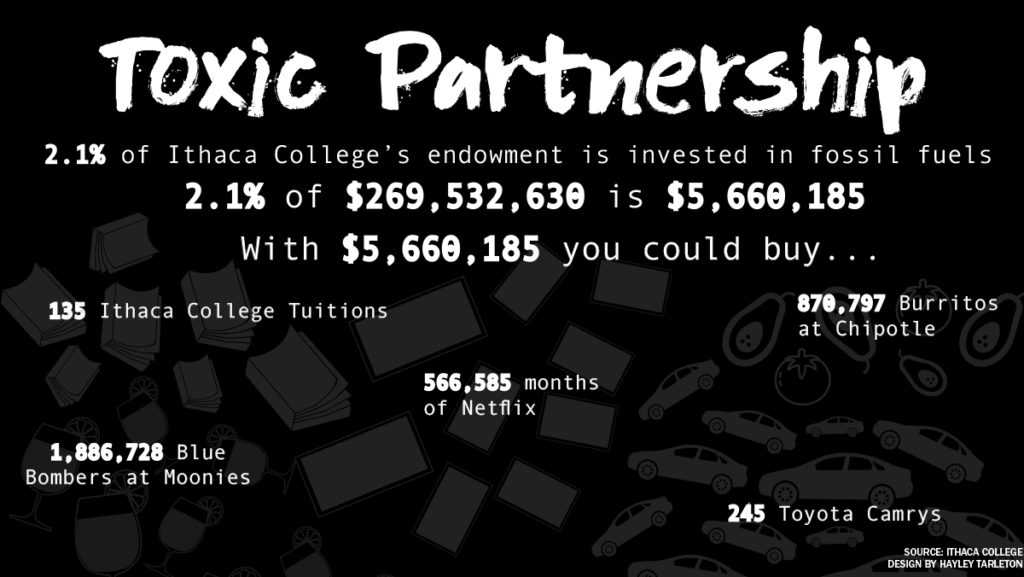Nearly 100 colleges and universities globally have committed to either partial or full fossil fuel divestment, yet Ithaca College has not, saying its current investment strategy allows it to afford other sustainable practices.
Fossil fuel divestment means removing all investments in fossil fuel companies, such as ExxonMobil, Chevron and Peabody Energy. The fossil fuel divestment movement, spearheaded by the nonprofit organization 350.org, aims to hold institutions and corporations accountable for profiting from products that produce greenhouse gasses that contribute to global warming, and also encourages reinvestment in socially and environmentally responsible sources. In 2013, there was a large divestment movement called IC Divest on the college’s campus. However, since then, the movement has dwindled, and the college still invests in fossil fuels.
The college currently has about 2.1 percent of its $270 million endowment invested in fossil fuels, said Janet Williams, interim vice president for administration and finance. Williams declined to name the fossil fuel companies the college is invested in.
The Park Foundation, a large donor to the college; Syracuse University; and the City of Ithaca have all divested. Last February, the Cornell University Board of Trustees voted against divestment.
Jessie Braverman ’16, a leader of the past IC Divest movement, said the movement died out after about two years because students involved graduated and the administration was not receptive to their ideas. She said they met with administrators and that it seemed they were not willing to negotiate.
“A huge issue was the structure of academia and the entire system which allows the administration to meet with students behind closed doors but basically wait for them to graduate and wait for the movement to die,” she said.
Braverman also said the movement died out because it was exhausting to be a student and campaigning for this movement at the same time.
“I’m trying to uphold my institution to the same values it was teaching me,” she said.
At the end of Fall 2016, IC Progressives held a teach-in about divestment. Senior Catherine Proulx, president of IC Progressives, said the group is planning to begin the divestment movement again this semester largely because of issues with the Dakota Access Pipeline in North Dakota, where people are protesting the construction of a pipeline being built through sacred native lands. IC Progressives recently began handing out petitions asking the college to divest.
Williams said the college does not want to divest from fossil fuels because it would require changing the college’s investment policies and portfolio. She said the current portfolio and policies allow for the college to participate in sustainable practices like the solar array, which went live in November, LEED Certified buildings and environmental research.
“We believe that continuing to support the college with our current policies and investment portfolio allows us to support these different endeavors around reducing our footprint … and that’s a more direct impact than divesting,” she said. “It’s intended to create the maximum amount of return we could possibly get to support our activities. That diversification is important.”
Former President Peggy Ryan Williams signed the American College and University Presidents’ Climate Commitment, now known as the Climate Leadership Commitments, in 2007, pledging the college to be 100 percent carbon neutral by 2050. The college’s Climate Action Plan does not require the fossil fuel divestment.
Brett Fleishman, a senior analyst at 350.org, said he believes a college is not carbon neutral if it is investing in the fossil fuel industry. He said the college is contradicting its values by betting the industry will do well and bring in revenue, yet at the same time committing to not using its products.
“It seems like an extreme contradiction at the best, and at the worst, hypocrisy to make a commitment not to use those products themselves, but to bet that the rest of the world will use them,” Fleishman said.
Chris Fiore, a senior economist at Compass Lexecon, an economic consulting firm that assisted with multiple research papers related to divestment, said he advocated for colleges and universities not to divest for many reasons, including the importance of having a diverse investment portfolio.
One of the papers Compass Lexecon worked on found a diversified investment portfolio with fossil fuel assets produced average annual returns 0.7 percentage points greater than a portfolio not invested in fossil fuels.
Fiore said this is because the energy sector allows for the greatest diversification of investments because it has the lowest correlation to the rest of the economy, meaning it often does well when the rest of the economy does poorly.
“If the economy does well, and you have a stock that always does well when the economy does well, and always does poorly when the economy does poorly, that’s not going to give you a large amount of diversification because you’re just going to get the same outcome,” he said.
Janet Williams said she believes the college is doing well in terms of sustainable practices and investments.
“Our low exposure in fossil fuel companies and our proactive efforts is on par and maybe even beyond what many others in this space are doing,” Williams said.
However, numerous other colleges and universities are fully divested and are still a part of other sustainable practices.
Hampshire College, which has 1,400 students and is in Amherst, Massachusetts, initiated its divestment movement in 2011 and by September 2016 was fully divested with zero investments in fossil fuel companies, said David Dinerman, chair of Hampshire’s board of trustees’ Investment Committee. Dinerman said Hampshire’s endowment is just under $50 million and that Hampshire had just under 3 percent invested in fossil fuel companies prior to divestment.
He said Hampshire’s endowment has been performing better than before divestment, attributing the improvement to good investment managers, equities performing well and not being invested in fossil fuels.
“People often say there’s a price for doing it this way — I don’t buy that,” Dinerman said. “We have been outperforming over the last several years.”
Hampshire is pledged to being carbon neutral by 2020, and Dinerman expects it to reach that goal. He said divestment is a part of that.
In December 2014, The New School in New York City, which has almost 7,000 undergraduate and over 3,000 postgraduate students, committed to divestment, said Linda Hirst, senior director of investments and risk management there.
The New School has an endowment of over $300 million, and Hirst said the school had 1.8 percent of the endowment invested in fossil fuels prior to divestment. Now, that number is 0.159 percent.
Hirst said the most difficult part of the divestment process was educating the board and changing the investment policy, but overall, she said she thought it has gone very smoothly.
Fleishman said it is easier for larger institutions to divest, as investment firms are more compliant because they want to keep the institution’s large investment. Fleishman also said small colleges are often invested in commingled funds — funds that contain assets from multiple institutions that are invested together — making it more difficult to divest. He said there are enough institutions that want to divest that there are fossil-free commingled funds available.
The majority of the college’s endowment is invested in commingled funds, Williams said.
She said the community needs to work together, even with fossil fuel companies, to improve the environment.
“We’re listening to their concerns, and we believe that we need to partner even with fossil fuel companies who need to be part of the solution, as a whole … to help improve our environment,” she said.
Proulx said while changing investments may not be easy, the college must consider it.
“Change is never easy, and doing the right thing is not always the easy thing to do either, but we have to consider saving the planet and how we’re going to continue to live on this planet,” she said.
President Tom Rochon declined comment because investments are a board of trustees function. Thomas Grape, chair of the Ithaca College Board of Trustees, was not available for comment.








